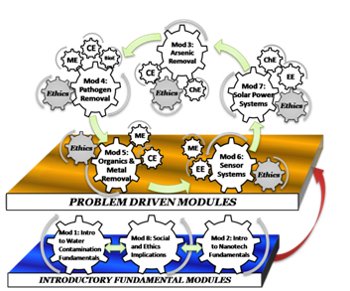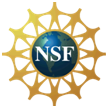This proposal is designed to offer an opportunity to teach the principles and application of nanotechnology through a real-world problem of global significance: water decontamination. The proposed course will address five focus areas under the common water contamination theme, namely, (i) arsenic, (ii) pathogens, and (iii) organics/metal contamination and remediation, (iv) contaminant sensors, and (v) alternative power supply for treatment systems. Principles drawn from different engineering disciplines will be necessary to address the aforementioned foci. The course has three principal goals: (1) introduce nanotechnology to engineering students who otherwise have no formal exposure to this important emerging technology; (2) integrates the approaches pertaining to nanotechnology offered by different engineering disciplines; and (3) fully incorporate discussions about the practical ethical implications of implementing nano in a real, developing world context. In addition, students who complete the course will have the opportunity to travel to Bangladesh, meet researchers and students at the Bangladesh University of Engineering and Technology, and visit actual water decontamination sites in that region. The course will also include students from Claflin University, a historically black college that will broaden the impact of the course to a larger, more diverse audience. The overall outcomes of this project include (a) development of an introductory nanotechnology class, (b) making the individual modules of the class available to other classes within USC and beyond, (c) incorporation of technical articles as the driver of the technical modules for student exposure to scientific research, (d) inclusion of minority students from Claflin University, and (e) international collaboration through the study-abroad program in Bangladesh.
The new Introduction to Nanotechnology course will be inquiry- based, that is, taught through addressing a 'driving question' on the common water decontamination theme. The teaching methods will include, but are not limited to, the use of scientific literature to choose the driving question for each focus area. There will be eight modules that will be developed for the class. The modules are: (i) General physics, chemistry, and biology at the nano-scale, (ii) i Introduction to global water contamination issues, (iii) Arsenic contamination and remediation, (iv) Pathogen (bacteria and virus) contamination and remediation, (v) Organics/metal contamination and remediation, (vi) Chemical sensor technology, (vii) Alternative power supply (solar) for water treatment, and (viii) Social and ethical implications of nanotechnology. Modules 1-7 will occupy 2 weeks each in a semester (14 weeks total), taught 3 hours per week. Module 8 (societal) will meet each week for an hour and discuss practical ethical issues that may arise from implementation of technical aspects under examination that week.


 National Science Foundation (EEC); Award # EEC-1042040
National Science Foundation (EEC); Award # EEC-1042040